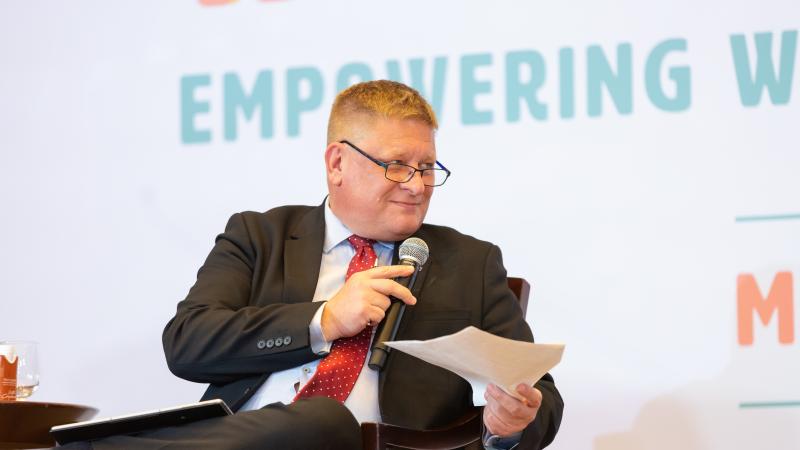Cambodia Investment Review
Chris Humphrey, the Executive Director of the EU-ASEAN Business Council (EU-ABC), was recently featured in the EuroCham newsletter where he spoke about the current EU business sentiment towards Cambodia, the potential of the automotive and renewable energy industries, and how the Kingdom can effectively navigate its forecast graduation from LDC status in 2027.
Humphrey has led the EU-ABC for nine years and has visited Cambodia frequently during his tenure. Currently on the agenda for the EU-ABC are visits to the Philippines for a mission trip and a Global Anti-Illicit Trade Summit.
Positive Business Sentiment Towards Cambodia
According to Humphrey, the EU business sentiment towards Cambodia is extremely positive. “Over 60 percent have a positive view of the region and believe it’s the region with the best economic opportunity,” says Humphrey. The business-friendly environment in Cambodia and the government’s openness make it an attractive destination for European businesses.
Moreover, Cambodia’s young population and central geographical location provide a significant advantage for the country. “They provide a source of labor as well, something for example Thailand is struggling to provide at the moment,” Humphrey adds. He also highlights the role European businesses can play in the energy transition, helping to green the energy supply in Cambodia.

Humphrey believes that the upcoming Southeast Asian Games (SEA Games) will have a positive impact on Cambodia’s economy. “It will really help in highlighting what a great country Cambodia is, and hopefully will be a further boost for tourism,” he says. A successful SEA Games will enhance Cambodia’s reputation in the eyes of Europe.
Regarding tourism, Humphrey emphasizes the need for the country to diversify and promote eco-tourism. “They do need to promote more, the country has so much to offer. It’s a great destination to relax and there’s a huge market for eco-tourism,” he states. European companies such as booking.com are already pushing for sustainable tourism, providing Cambodia with a great opportunity to tap into this market.
Cambodia’s developing industries
When asked about the evolution of Cambodia’s auto industry, Humphrey doesn’t foresee it becoming a major automotive production hub like Thailand. Instead, he suggests Cambodia should explore the niche of electric or hydrogen-powered vehicles. “They need to start thinking, what can we do in Cambodia? Can we afford to put in place the infrastructure to support electric vehicles?” Humphrey remarks.
Read more: ABA becomes the exclusive bank sponsor of Cambodia SEA Games 2023
He believes Cambodia should capitalize on its available land and workforce to manufacture motorbikes, tuk-tuks, or commercial vehicles. “They have the land, and I think they have the people for it,” he says. Humphrey emphasizes that any automotive investment would need to ensure that manufacturing and export to the region and beyond is feasible.
In terms of regional competition, he adds, “If you look around the region, Thailand is the Detroit of Southeast Asia, and then you’ve got significant industries in Indonesia, Malaysia, and Vietnam. Can Cambodia get part of that? Setting up a car plant is an expensive business. So anybody looking at it needs to be assured that they can manufacture, can export to the region and elsewhere, and make sure the right staff with the right expertise.”

Humphrey views the recent deal that will see Cambodia export renewable energy to Singapore as a positive development. “Singapore has an absolute need to green its power supply. Being a small country, there’s a limit to what they can do themselves. You can’t put too many wind turbines up in Singapore, the land’s not there for it. They’re covering almost every rooftop they can with solar panels, but it’s not enough. So they need to do more, the deal with Cambodia, and other deals with countries in the region, it’s the only way they can go,” he explains.
Humphrey also emphasizes the benefits of regional cooperation in the energy sector. “This also boosts the whole idea of an ASEAN grid in the process, which can only be a good thing for everybody,” he says. The deal reflects the growing focus on sustainability initiatives in Europe, which will impact businesses exporting to the EU.
These sustainability initiatives will “force European companies and local firms to clean up their act, green their supply chains, and make sure there’s no forced labor in their supply chains,” according to Humphrey. He believes that this will ultimately benefit Cambodia, as it will lead to improved employment levels and the transfer of innovative technologies.
Navigating graduation from LDC status
As Cambodia prepares to graduate from LDC status in 2027, Humphrey advises the country to focus on developing fast enough to avoid getting caught in a trap of losing preferences and not having Free Trade Agreements (FTAs) in place.
Cambodia is forecast to graduate from its Least Developed Country (LDC) status in either 2027 or 2028, according to a report published by the UN Development Programme (UNDP. LDC status offers preferential and highly beneficial trade privileges. Continued access to concessional development finance can help consolidate recent advances and address current and emerging development challenges and opportunities.
Read more: Sovereign bonds needed as Cambodia forecast to graduate from LDC status by 2028 says UNDP
Humphrey acknowledges that a Europe-Cambodia FTA might be a long way off, but suggests that Cambodia’s best hope lies in the EU making rapid progress on FTAs with countries in the region, paving the way for a future region-to-region FTA.
“The bilateral FTAs might also allow for some ASEAN accumulation to allow access to preferential tariffs for companies outside of the direct deal. For example, something could be made in Cambodia, finished in Thailand, and then sent to the EU,” Humphrey explains.
To maintain competitiveness, Humphrey recommends that Cambodia move up the value chain in manufacturing, producing higher-quality goods at a low price point – a challenging but necessary task. “The country should also move up the value chain on manufacturing to produce higher quality goods, while still maintaining a low price point, but that is not an easy task,” he says.





